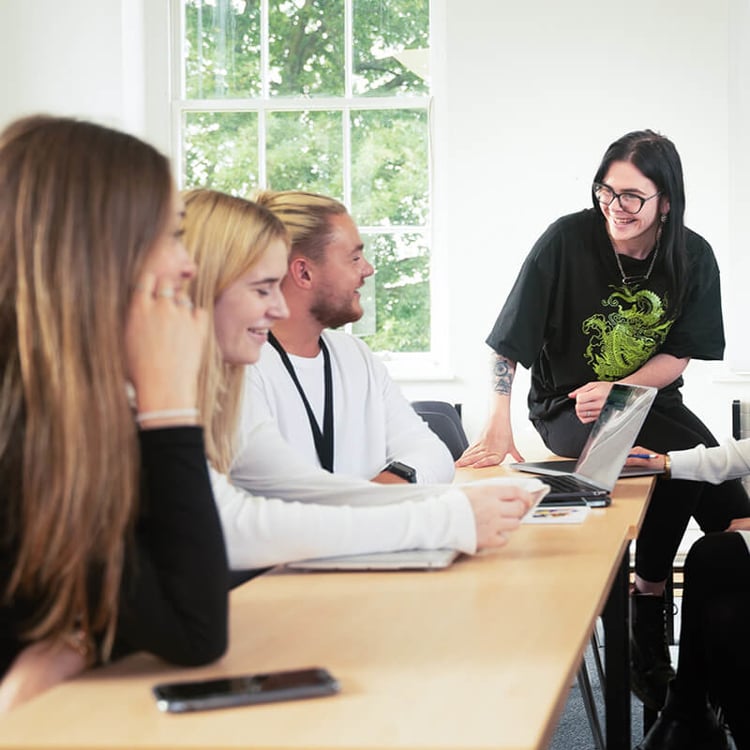/ Undergraduate /
Start date:
September 2025
You'll need:
112–128 UCAS points (or equivalent)
Foundation Year: 64–80 UCAS points (or equivalent)
UCAS code:
C800
C801 (if choosing Foundation Year)
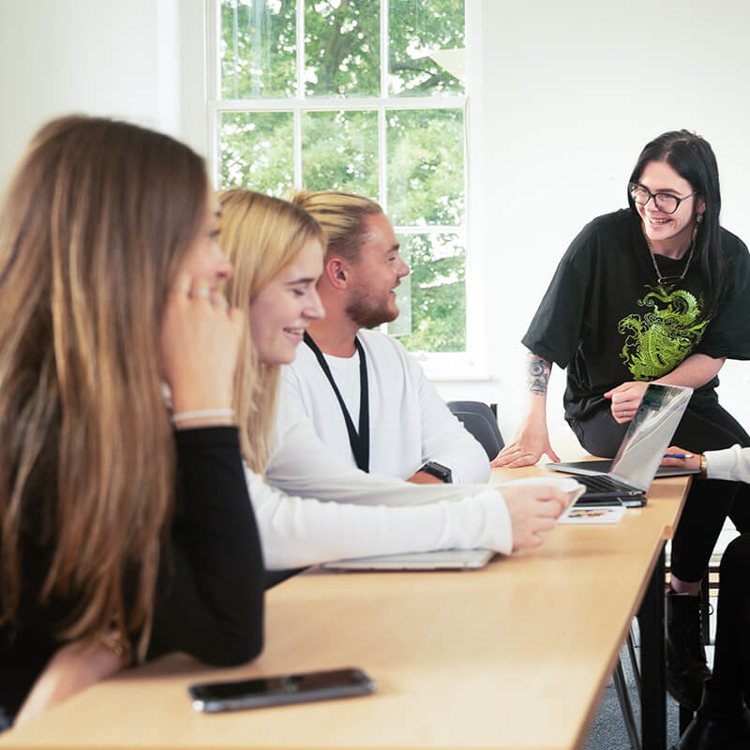
On-Campus Open Day
Saturday 12 July 2025
Learn how to solve real-world problems by understanding the human mind, and gain the skills and professional experience you need to stand out.
Did you know?
At least 50% of our degree is delivered in small classes so you work closely with your lecturers and fellow students.
Gain additional qualifications, such as a certificate in Mental Health First Aid, to give you a head start in your career.
Top 3 modern university in London
(Complete University Guide 2025)

Ranked in the top 15% in the world
Times Higher Education Young University Rankings 2024

#8 in England for undergraduate student satisfaction
National Student Survey 2024

Modules
Modules Details: This module provides an opportunity to maximise your success within and beyond your degree. Through interactive lectures and seminars, you will explore topics that prepare you for university, postgraduate study, and the workplace. Sessions address procrastination, time management, and anxiety, helping you reach your full potential. You will develop research and reporting skills essential for psychology and related fields. The module also explores artificial intelligence (AI), emphasising its role alongside human intelligence. Additionally, you will identify and develop key skills, gaining insight into future career opportunities and professional growth, empowering you to excel in your chosen path.
How you’ll learn: You will be taught through a mixture of lectures and seminars. Lectures will cover key information and concepts to support your personal development. The seminars offer hands-on opportunities to apply lecture concepts in practice. You'll work independently and with peers to develop skills such as resource finding, debating, analysing, and presenting. You will also learn to use AI critically, ethically, and creatively—for example, for feedback, discussing complex ideas, and interview practice. This will help deepen your understanding while identifying AI’s limitations. Seminar activities will also support your assessments, enhancing your ability to engage with AI effectively and refine your academic skills.
Assessment: The assessments provide engaging ways to showcase your skills and understanding. You will be evaluated through a presentation, a critical debate, and a reflection. These tasks will enhance your ability to communicate clearly, present information effectively, and write persuasively. You will also develop skills in using AI for critical debate and reflection. These assessments will strengthen key abilities essential for your degree, postgraduate studies, and many workplaces, preparing you for future academic and professional success.
Module details: In this module, you will explore the foundations of psychology, gaining essential knowledge for your degree. You will study historical perspectives and key areas, including cognitive psychology, which examines mental processes; biological psychology, which links biology and behaviour; developmental psychology, which explores human growth; and social psychology, which investigates social influences. You will also consider individual differences. By integrating these perspectives, you will develop a well-rounded understanding of psychology and essential research methods, preparing you for further study and careers in related fields.
How you'll learn: You will be taught through lectures and seminars. Lectures provide an overview of each topic, highlighting psychology's contributions and applications. Seminars, linked to lectures, offer interactive engagement through discussions, debates, and quizzes. Activities may include applying concepts to real-world issues and research practical's illustrating psychological methods and data interpretation. Each seminar is tailored to its topic while supporting assessments. This approach ensures a dynamic learning experience, deepening your understanding of psychology in practical contexts.
Assessment: Assessment for this module includes a poster and a portfolio, helping you develop research, presentation, and written communication skills. You will enhance your ability to summarise information, evaluate material, and think analytically. These skills are essential for your degree, postgraduate studies, and are highly valued by employers.
Module details: This module introduces research approaches and data analysis methods used in psychology and related fields. You will learn to develop research questions and analyse data using both quantitative and qualitative methods. Quantitative analysis includes statistical techniques to describe data and explore relationships, while qualitative methods focus on identifying themes in text or interviews. This knowledge is essential for your degree, particularly for further data analysis and your final-year research project, as well as for postgraduate study and workplace applications.
How you'll learn: This module combines lectures and workshops to develop your understanding of research approaches and data analysis. Lectures will introduce key concepts and theories, while workshops provide hands-on experience in developing research questions, designing studies, and analysing data. You will also learn to use various software packages for data analysis. These interactive workshops will reinforce lecture content and support your assessments, ensuring you gain practical skills essential for conducting research throughout your degree and in future academic or professional settings.
Assessment: In this module, you will be assessed through a poster on a specific research question and a portfolio including tasks such as a literature review and research write-ups. These assessments will develop your research, data analysis, written communication, and presentation design skills, which are essential for your degree, postgraduate studies, and are highly valued by employers, enhancing your employability.
Module details: This module explores the practical applications of psychology in addressing real-world issues, such as environmental concerns, mental health, and ageing. You will learn how psychological theories and research can be applied to everyday experiences and societal challenges, highlighting their potential to influence positive change. This knowledge will not only prepare you for further studies but also enhance your employability, as the ability to apply psychological principles is valued across many careers. Additionally, the module will broaden your awareness of potential career paths.
How you'll learn: You will be taught through lectures and interactive seminars. Lectures provide a theoretical overview, demonstrating psychology's role in solving real-world problems, while seminars focus on assessments, group discussions, and practical activities such as designing campaigns and interventions.
Assessment: This module is assessed through a campaign strategy with public communication and an essay, developing your skills in communication, critical thinking, problem-solving, and applying psychology to real-world issues. These skills will support your degree, postgraduate study, and career prospects, enhancing your employability.
These modules are those we currently offer and may be subject to change.
Module details: This module will develop your knowledge of key areas in psychology, including social psychology, developmental psychology, and individual differences. You will explore how social influences shape thoughts and behaviours, how cognitive, social, and emotional development occurs across the lifespan, and how individuals differ in these processes. By evaluating different explanations for human behaviour, you will consider real-life applications, such as the impact of social media, peer influences, neurodiversity, and identity formation. This knowledge is essential for further study on social and developmental psychology and is valuable for careers in education, healthcare, social care, and community settings.
How you'll learn: This module is delivered through lectures and seminars, covering conceptual, theoretical, cultural, and historical perspectives on behaviour, identity, and individual differences. Lectures will link content to current affairs, while seminars will include interactive activities such as quizzes, discussions, and practical research exercises. You will explore real-world applications, such as identity formation and intelligence testing, while developing teamwork and self-reflection skills. These transferable skills will benefit various career paths, and seminar activities will also support you in preparing for assessments.
Assessment: You will be assessed through a poster and a portfolio, which will enhance your skills in presentation design, communication, and the ability to summarise, synthesise, evaluate, and apply psychological knowledge. These skills are essential for further study and postgraduate education, as well as highly valued by employers, supporting your future career development.
Module details: This module explores the experiences, symptoms, biological basis, and treatment of psychiatric conditions such as schizophrenia, depression, and anxiety. You will examine epidemiological, genetic, cultural, social, psychological, and neurobiological factors underlying mental health conditions, alongside contemporary theories. Treatment approaches, including pharmaceutical treatments, cognitive enhancement, neuromodulation, and psychological therapies, will also be covered. This knowledge will support your degree, postgraduate studies, and careers in mental health, such as roles in the NHS, counselling, or psychiatric research, while enhancing your ability to contribute to society.
How you'll learn: Teaching will be delivered through lectures and seminars, with lectures covering key information on mental health conditions, including diagnostic criteria, contributing factors, and treatment options. In seminars, you will apply this knowledge to real-life case studies, formulating diagnoses and treatment plans based on individuals' symptoms, while also receiving support for your assessments.
Assessment: In this module, you will complete two assessments to develop your understanding and practical skills. First, you will create a service user leaflet, translating psychological concepts into clear, accessible language—a key skill in mental health work. Second, you will analyse a case study, formulating a diagnosis and treatment plan based on psychological theories and evidence. These tasks will enhance your critical thinking, communication, and reflective skills, preparing you for further study and careers in mental health and related fields.
Module details: In this module, you will explore the fundamental processes underlying human cognition and the relationship between physiological functions and mental processes. Key topics include learning, perception, attention, memory, and language, alongside the neurobiological basis of psychological experiences. Using current neuroscience research, you will develop an understanding of how biological factors influence cognition. Through theoretical study and empirical research, you will gain essential knowledge for further study, postgraduate education, and careers in psychology, neuroscience, and related fields, enhancing your academic and professional development.
How you'll learn: In this module, lectures and seminars will explore conceptual, historical, and contemporary ideas in cognitive and biological psychology. Lectures will cover key concepts and theories relating to topics in cognition and neuroscience. Seminars will include practical activities to apply theories from lectures and provide support for assessments, encouraging critical engagement with the material.
Assessment: In this module, you will be assessed through a presentation and a portfolio, enabling you to further develop skills in effective communication, critical handling of materials, and scientific reasoning to explore alternative approaches and solutions—key competencies for your future studies and employment.
Module details: In this module, you will expand your understanding of research approaches and data analysis methods in pPsychology and related fields. You will develop skills in advanced quantitative and qualitative analysis, including ANOVAs, regression, psychometrics, and qualitative methods like interpretative phenomenological analysis (IPA) and discourse analysis. This knowledge will be essential for your degree, particularly your independent research project in Year 3. More broadly, mastering research methods will enhance your ability to evaluate evidence throughout your studies. These skills are also highly valuable for postgraduate study and a wide range of careers that require data analysis and critical thinking.
How you'll learn: This module will be delivered through a combination of lectures and workshops, with lectures covering key concepts and theories in data analysis. In workshops, you will apply this knowledge by developing and conducting research studies, analysing data, and engaging in activities that support your assessments.
Assessment: You will be assessed through a qualitative and a quantitative research report, where you will describe the study's background and methods, analyse a dataset, and interpret the findings in the context of existing research. These assessments will enhance your research, data analysis, and written communication skills, which are essential for your degree, postgraduate studies, and a wide range of careers.
These modules are those we currently offer and may be subject to change.
This course offers all students the option of a one-year paid work placement, to boost your employability even further. If you choose this route, you will take the placement following year two of your course, and then return to complete your degree.
Why take a placement?
A placement year is the perfect opportunity to gain valuable work experience, to build on the career skills we will teach you on this degree. The connections you make on the placement will improve your career prospects further, and equip you with the skills you need to secure graduate-level employment.
How we support you
The University's Placement and Work Experience Team are experts at helping you to secure a placement. They will work closely with you from the start, helping you research potential employers, discover placement opportunities, create and pitch your CV, and will coach you to perform well in interviews. We aren't able to guarantee a placement, but our sector-leading advisors will give you the best possible chance of securing one.
Find out more about how we'll support you
We understand that your plans might change once you start your programme. If you decide not to do a placement, you will have the option of completing the three year version of your programme.
Whatever your choice, you will have access to many opportunities for work experience through our Placement and Work Experience Team, and access to face-to-face and 24/7 online careers support.
Module details: In this module, you will apply your knowledge of psychological research methods and data analysis to design, conduct, and report on an independent research project. You will formulate research questions, collect and analyse data, and interpret your findings in the context of existing literature, considering their implications. The available projects will cover various areas of psychology, allowing you to choose a topic of personal interest. The skills gained in planning, executing, and reviewing research are valuable for postgraduate studies and many careers.
How you'll learn: You will be supported by a supervisor with expertise in your chosen topic area, meeting regularly, typically in small groups. In addition to these meetings, lectures and workshops will help develop your research skills and support your work for the module, with lectures covering report-writing and data analysis methods, and workshops offering opportunities to apply these concepts to your own project. These sessions will provide valuable support for your assessments throughout the year.
Assessment: Whichever project you choose, you will need to write a project report and deliver a poster presentation, helping to develop your written and oral communication skills. Throughout the module, your work will also enhance your research and project management abilities, equipping you with a range of transferable skills that are valuable for postgraduate studies and various graduate careers.
Module details: This module will enhance your workplace professionalism and personal development, equipping you with key skills for your career. You will develop communication, reflective, and self-presentation skills while applying psychological literacy to ethical considerations, social responsibility, and self-regulation. Topics include leadership styles, emotional intelligence, and conflict management. You will complete a personal development portfolio, gain at least 30 hours of work experience, and earn certifications in areas such as diversity and leadership. This module will strengthen your CV and prepare you for future career opportunities, integrating theoretical concepts into real-world practice.
How you'll learn: This module will be delivered through a combination of lectures and workshops. In lectures, you will learn key career skills and explore potential career paths, while workshops will allow you to apply these concepts to your own personal development, reflecting on your strengths and areas for improvement. The workshops will also support your preparation for the assessment.
Assessment: You will be assessed through a portfolio, which will require you to complete the Chancellor's Career Award, at least 30 hours of work experience, and online training. Within the portfolio, you will reflect on your personal development and skills gained from the Chancellor's Career Award and work experience. You will also reflect on a potential career path after your degree and your next steps in personal and professional development. This assessment will enhance your reflective and written communication skills, which are highly valued in various careers and will support your career progression.
Module details: In this module, you will learn about the impact of brain damage on cognitive functioning, developing your understanding and critical analysis of key areas in neuropsychology across the lifespan. You will explore each major lobe of the brain and cover both sustained and progressive neuropsychological disorders. Each week will focus on a specific topic within the field. This module will enhance your knowledge of cognitive psychology and neuroscience, particularly useful if you are interested in a career working with neuropsychological patients or related research.
How you'll learn: You will be taught through a combination of lectures and seminars. The lectures will provide the foundational material for each topic, while seminars will involve activities such as critical discussions of key papers and case study videos on neuropsychological conditions. These in-depth discussions will help you explore theoretical, methodological, and statistical issues, deepening your understanding of current debates in the field. The seminars will also support your preparation for the module assessments, enhancing your overall learning experience.
Assessment: Your knowledge of neuropsychology will be assessed through a presentation and a stakeholder report. These assessments will help you build on the critical evaluation skills developed in previous years. The module will further enhance your oral and written communication, as well as your reflexive skills. These skills are highly valued for postgraduate studies and are essential for employment in a range of careers related to psychology and neuroscience.
Module details: This module aims to develop your understanding of applying psychology to education. You will explore the psychology of learning and teaching, critically examining how psychological theories inform policy and practice across various educational settings. The module will deepen your understanding of child learning, teaching methods, and educational strategies in real-world contexts. It provides a valuable pathway for those interested in careers in educational psychology, teaching, special educational needs, or mental health in education, offering insights into diverse educational challenges.
How you'll learn: Through a combination of weekly lectures and seminars, you will explore contemporary learning contexts, including psychological approaches to educational transitions, the impact of technology on learning and wellbeing, and systemic barriers to optimal learning outcomes. Lectures will cover core concepts and key issues, while seminars will allow you to engage in critical debate and develop transferable skills such as communication and teamwork through practice-based activities. You will also receive feedback and support in designated seminars to help prepare for your assessments.
Assessment: Your assessments for this module will include a presentation and an intervention proposal, designed to showcase your critical evaluation and problem-solving skills in addressing real-world issues in education settings. These assessments will also assess your written and oral communication abilities. Developing these competencies will enhance your employability and provide valuable skills for postgraduate studies and various professional environments.
Module details: This module offers an in-depth exploration of forensic psychology, focusing on the psychological foundations of criminal behaviour and its application in criminal justice settings. You will critically assess theories and research on offending behaviours, considering factors like mental health, socioeconomic status, substance misuse, and life events. Topics such as eyewitness testimony, jury selection, rehabilitation models, and the relationship between mental illness and crime will provide you with a holistic understanding of forensic psychology in real-world contexts.
How you'll learn: Lectures will present core content, including psychological theories and research, complemented by case studies, videos, and insights from forensic professionals. Seminars will be interactive, with group discussions, case study analyses, and debates on key topics, helping you develop critical thinking and problem-solving skills. These sessions are closely aligned with module assessments, ensuring you gain the necessary analytical and reflective skills to succeed.
Assessment: Assessment in this module consists of a presentation and an intervention proposal, testing your ability to apply psychological theories to real-life cases. You will be evaluated on your oral and written communication skills, as well as your capacity to synthesise and critically evaluate research. The assessments will reflect the skills required for postgraduate study and careers in forensic psychology, criminal justice, and related fields, helping you develop valuable competencies for professional settings.
Module details: In this module, you will explore how people interact with each other, examining psychological experiments and real-world observations. You will also learn how insights from linguistics, sociology, anthropology, and philosophy enhance our understanding of social interaction. Key topics include turn-taking, opening and closing conversations, and managing communication issues. This module will develop your critical understanding of human interaction from various perspectives, equipping you with valuable interpersonal and communication skills for careers in fields such as HR, sales, and other roles requiring strong social skills.
How you'll learn: You will be taught through a combination of lectures and seminars. Lectures will cover key theories and research on communication and social interaction, while seminars will involve activities that help you analyse social interactions and apply research findings to real-world situations. These sessions will also provide support as you prepare for the assessments in this module.
Assessment: You will be assessed through a presentation and an intervention proposal, which will help you develop your oral and written communication skills for different audiences. These assessments will also enhance your ability to synthesise, summarise, and critically evaluate knowledge, as well as improve your problem-solving skills and ability to apply theory to real-world settings. As a result, you will gain a range of transferable skills valuable for postgraduate studies and many graduate careers.
Module details: In this module, you will explore positive psychological theories, concepts, and research, critically examining their application in various real-world settings. You will study core topics such as happiness, wellbeing, resilience, optimism, flow, and flourishing. The module also introduces psychometric tools to assess constructs like personal strengths, resilience, and emotional intelligence. It will equip you with knowledge and skills applicable across diverse work environments, while helping you identify your own strengths, values, and motivations. This module is ideal for those pursuing careers in coaching, occupational psychology, or mentoring.
How you'll learn: Through weekly lectures and follow-up seminars, you will explore how different methods and techniques enhance performance in various settings, including educational, organisational, and personal contexts. You will critically examine psychological research on applied positive psychology and relate topics to your own experiences. Seminars will offer opportunities for small group work, personal development activities, and reflective practice, while dedicated sessions provide assessment support and feedback. Asynchronous digital resources will also be available weekly, allowing you to consolidate your learning at your convenience.
Assessment: The assessments for this module provide various ways to demonstrate your knowledge and understanding. You will complete an intervention proposal, where you'll critically evaluate a real-world issue, and a reflective audio diary, in which you'll reflect on your personal development and the broader application of positive psychological techniques. These assessments will help you develop key skills that will be valuable for postgraduate studies, a variety of workplaces, and your personal development.
Module details: In this module, you will explore neurodevelopmental conditions, with a focus on autism. Adopting a multidisciplinary approach, you will learn about how autistic individuals process and understand information, as well as assessments and, therapies for autism, and factors influencing the development of autism development. You will also examine other neurodevelopmental conditions, comparing similarities and differences between these. The module will cover current perspectives, future research directions, and societal views on neurodiversity. Emphasis will be placed on applying theoretical knowledge to support individuals, making this module particularly relevant for future careers in related fields.
How you'll learn: You will learn through a combination of lectures and seminars. Lectures will cover key theories and research on autism and other neurodevelopmental conditions. In seminars, you will engage in activities to explore how to apply this knowledge in supporting individuals, including assessments and therapies for these conditions. The seminars will also provide guidance and support for your module assessments.
Assessment: You will be assessed through a leaflet and a stakeholder report. The leaflet will help you develop skills in communicating with non-academic audiences and applying knowledge of neurodevelopmental conditions to support individuals. The stakeholder report will enhance your written communication, critical evaluation, and ability to synthesise and summarise information on autism and other neurodevelopmental conditions. These assessments will help you develop key transferable skills, which are valuable for postgraduate studies and a range of graduate career opportunities.
Module details: This module introduces consulting in organisational psychology and management principles. You will explore the evolution of organisational psychology, from its early foundations to contemporary issues such as motivation, work-related stress, work-life balance, and diversity. By analysing case studies, you will apply psychological theories to real-world challenges, considering ethical and methodological dimensions. You will also examine how AI can be used in organisational settings, comparing it with evidence-based practices. This module will develop skills essential for postgraduate studies and careers in HR, recruitment, consultancy, and organisational psychology.
How you'll learn: This module will be taught through a combination of lectures and seminars. In lectures, you will explore key concepts and theories in organisational psychology and management, along with their real-world applications, while seminars will involve activities such as analysing case studies and applying knowledge to practical contexts. These seminars will also support you in preparing for the assessments in this module.
Assessment: The assessments for this module consist of a campaign design and a case study, both of which will develop your oral and written communication, presentation, and problem-solving skills. You will apply theoretical knowledge and research to real-world scenarios, critically evaluate different approaches, and consider ethical issues. Additionally, you will reflect on your own strengths, weaknesses, and professional identity. These assessments will help you develop essential skills for postgraduate studies and various workplace settings.
Module details: This module introduces major theories and research in health psychology, psychopathology, and addiction. You will explore psychological processes influencing physical and mental health, disease risk, and treatment barriers, including those in addictive behaviours. The biopsychosocial model will be examined to show how biological, social, and psychological factors interact in health, illness, and substance use disorders. This module will prepare you for careers in health or clinical psychology, including roles in public health, health advising, and addiction support, by addressing challenges in studying behavioural aspects of health.
How you'll learn: This module will be taught through a combination of lectures and seminars. Lectures will introduce theoretical frameworks and empirical evidence for each topic, providing an overview to guide your further reading and discussions. The seminars, which will be research-informed, will focus on the practical and applied aspects of each topic, including interventions, policies, and their implications. You will also have the opportunity to discuss your own research and reading, with the seminars supporting you in preparing for the module assessments.
Assessment: In this module, you will be assessed through a campaign design and a case study. These assessments will enhance your skills in summarising and synthesising knowledge, as well as improving your oral and written communication. They will also require you to evaluate and apply theories and research to real-world issues, helping you develop valuable skills for postgraduate studies and a variety of careers.
These modules are those we currently offer and may be subject to change.
This course offers a foundation year, which takes place at the beginning of your studies. Studying a foundation year will give you academic and practical experience, and a strong introduction to your subject, ensuring you succeed on your undergraduate degree.
30 credits
You will develop your core academic and integrated English language skills of speaking, listening, reading and writing. You will become familiar with key academic skills and concepts, such as referencing methods and awareness of academic integrity and tone. You will apply these skills and knowledge to both broad topics and also your chosen subject pathway.
Teaching and learning
You will be required to actively engage in on-campus learning for up to 10 hours a week.
You will be taught through a full range of teaching and learning methods, which include lectures, seminars, workshops, discussion groups, group directed tasks and presentations. This will enable you to learn from your peers and tutors in both structured and information settings.
You will be encouraged to think creatively about your approach to learning and discussions with your peers. You will also have access to recordings, resources, links and signposting through Moodle to enrich your learning.
Assessment
You will be assessed through group and individual presentations, comparative and reflective essays, multiple choice exams, coursework and reports, oral exams, portfolios, case studies and blogs.
30 credits
You will develop your research, numeracy and information technology skills. You will investigate the difference between primary and secondary research, conduct your own research project and demonstrate your findings through data analysis. You will also develop your awareness of equality, diversion and inclusion in the UK, through a real-world issue; discrimination in the workplace.
Teaching and learning
You will be required to actively engage in on-campus learning for up to 10 hours a week.
You will be taught through a full range of teaching and learning methods, which include lectures, seminars, workshops, discussion groups, group directed tasks and presentations. This will enable you to learn from your peers and tutors in both structured and information settings.
You will be encouraged to think creatively about your approach to learning and discussions with your peers. You will also have access to recordings, resources, links and signposting through Moodle to enrich your learning.
Assessment
You will be assessed through group and individual presentations, comparative and reflective essays, multiple choice exams, coursework and reports, oral exams, portfolios, case studies and blogs.
30 credits
This module focuses on an in-depth exploration of applied psychology, drawing on foundational theories and models that explain human behaviour. You will engage with the issues and debates around some of the core psychological concepts, such as prejudice, stereotyping, group dynamics, and conformity, gaining a broad understanding of what influences human behaviours.
The module introduces the bio-psycho-social model within health psychology, providing a holistic framework for understanding health-related behaviours. You will gain a knowledge of how different psychological theories and models can be applied to understand the development of risky health behaviours and can be applied to design effective health intervention strategies.
You will learn the skill of collaborative group work, which is an integral part of the module, encouraging you to apply your knowledge of psychological theories to analyse and present a case study on risky health behaviour. You will also develop the skill of critical analysis, integrating various theories and models in psychology to explain risky health behaviour and suggest intervention programs.
Teaching and learning
The teaching delivery for each module consists of one, one-three-hour lecture and one, two-hour seminar per week. You will learn through a blend of lectures and interactive sessions, case studies and group presentations.
There will be an additional 30 minutes of online support per week. This will consist of individual tasks such as quizzes, posting on discussion forums, watching videos and taking notes, and reading articles or chapters.
Assessment
This module will be assessed using a written assessment and a group presentation.
50% - written assessment, composed of two parts; essay and self-reflection. You will write an essay on your knowledge of at least two psychological theories or models to explain why people develop risky health behaviours and propose and evaluate intervention strategies. You will reflect on your experience and learning journey as you prepared for and wrote the essay.
50% - group presentation, where you will apply knowledge from psychology theories to plan health interventions on risky health behaviour.
30 credits
This module focuses on the different perspectives available in psychology to explain human behaviour.
You will get the opportunity to explore methods of scientific thinking and reasoning within a Psychology context in an enquiry-based way. Problem-based learning and blended learning (combines online and face-to-face time) approaches will facilitate deep, experiential learning.
You will gain knowledge on what scientific thinking is, how to distinguish this from pseudoscience and how the scientific cycle enquiry can be applied to the various perspectives in psychology.
You will be encouraged to explore how different perspective in psychology can explain human behaviour, scientific argumentation and ethical working practices in relation to current scientific topics as reflected in news reports, recent academic publications and historical case studies. You’ll gain the skill of critical thinking and how to apply concepts from psychology to explain everyday behaviour, as well as poster presentation and public speaking.
Teaching and learning
The teaching delivery for each module consists of one, one-three-hour lecture and one, two-hour seminar per week. Lectures will introduce the scientific basis of knowledge and research methodologies in the context of Psychology and empower you to distinguish between science and pseudoscience, while seminars will consist of individual and group activities on the weekly topics.
There will be an additional 30 minutes of online support per week. This will consist of individual tasks such as quizzes, posting on discussion forums, watching videos and taking notes, and reading articles or chapters.
Assessment
This module will be assessed using a group poster presentation and written assessment.
40% - group poster presentation, you will compare and contrast any two perspectives on psychology.
60% - written assessment, you will write a critical essay on how pseudoscience differs from science.
These modules are those we currently offer and may be subject to change.
Foundation Year
This course can also be studied with a foundation year (September entry only).
Our suite of Psychology programmes has a strong history of accreditation and has consistently been commended for our high-quality education and outstanding student experience by the British Psychological Society (BPS).
Following a recent review and enhancement, this programme has been carefully redesigned to continue meeting all BPS accreditation standards and is currently pending reaccreditation by the BPS in early spring 2025.
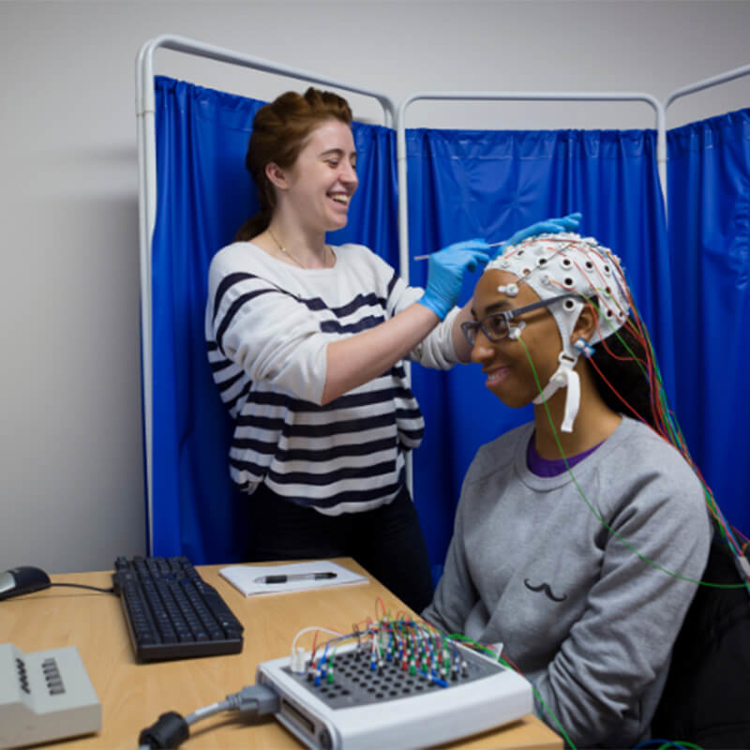
Skills
Develop your professional skills as you study real-life applications of psychology.
We offer an inspiring undergraduate curriculum, with a focus on mental health, that reflects the world we live in today. During your time with us, you’ll explore:
- how to solve real-world problems with your knowledge of our minds and behaviour
- research and analysis, and how to effectively communicate
- leadership, emotional intelligence, interpersonal skills and how group dynamics relate to the workplace and wider society.
You’ll work on core subjects within psychology and have the opportunity to shape your degree around your own interests and ambitions.
Topics you’ll study include:
- mental health
- developmental psychology
- positive psychology and wellbeing
- social psychology
- psychopathology.
You’ll study contemporary social movements and global crises, such as Black Lives Matter, climate change and #MeToo, through a psychological lens. You can also choose to take a standalone Equality, Diversity and Inclusion (EDI) module in Year 3.
Right from the start, you’ll explore the fascinating careers open to psychology graduates and learn how to apply your knowledge to different fields. You’ll also take a credited work experience module in Year 2, enabling you to build your CV before you graduate.
You can also gain additional qualifications throughout your degree, such as a certificate in Mental Health First Aid, to give you a head start in your career.
Learning
Enjoy a personal and practical approach to your studies.
At least 50% of our BSc Psychology degree is delivered in small classes, seminars, lab sessions or workshops. This increases your contact time with your lecturers and creates a supportive learning community where you can excel.
You’ll learn through practical activities as well as lectures, with discussions, presentations, teamwork and feedback playing a key role in your studies.
Our passionate and supportive tutors are also practitioners involved in the latest research in their fields. The work they undertake at our Centre for Research in Psychological Wellbeing (CREW) has a positive impact on mental health and wellbeing at a community, national and international level.
We have state-of-the-art facilities, including EEGs to record brain activity, eye-tracking software, an fMRI, and brain stimulation therapy, including Transcranial Magnetic Stimulation (TMS).
We are a community, and our student support is second to none, with BPS commendations for excellence. Whatever your personal circumstances or ambitions, we’re here to help you realise your full potential. Some of the support we offer includes:
- Academic Guidance Tutors: you’ll be allocated an experienced Academic Guidance Tutor to support you through your studies, help you pick your modules, and provide career advice.
- Student feedback and consultation hours: lecturers have drop-in office hours when you can go to them directly, arrange a video call or email to ask questions.
- Study skills for psychology: these are weekly sessions for all students who want to improve their academic writing, achieve better essay grades, overcome exam anxieties, develop further employability skills, and achieve their goals.
- Revision support: our lectures are delivered on-campus, but recordings are made available to support your revision.
- Study skills support: as higher education is different from school and college, our Academic Achievement Advisers are here to help you develop the skills you need at university and beyond.
- Welcoming community: when you join Roehampton’s School of Psychology, you become part of an inclusive community of students and academics. You can also join the Roehampton Psychology Society to connect with your peers and enjoy a varied programme of events, talks, debates and socials.

Dr Carla Startin
I am the Programme Leader for the BSc Psychology degree. My background is in cognitive neuroscience, and I joined Roehampton in July 2020. I largely teach our final year module on autism and other neurodevelopmental conditions, and I am also involved in teaching various aspects of applied psychology in Year 1. My current and previous research relates to differences between people in their cognitive abilities and related brain activity, and neurodevelopmental conditions relating to these - firstly differences in terms of how we process information during social interactions, and secondly differences between people with Down syndrome and the development of dementia in this population.
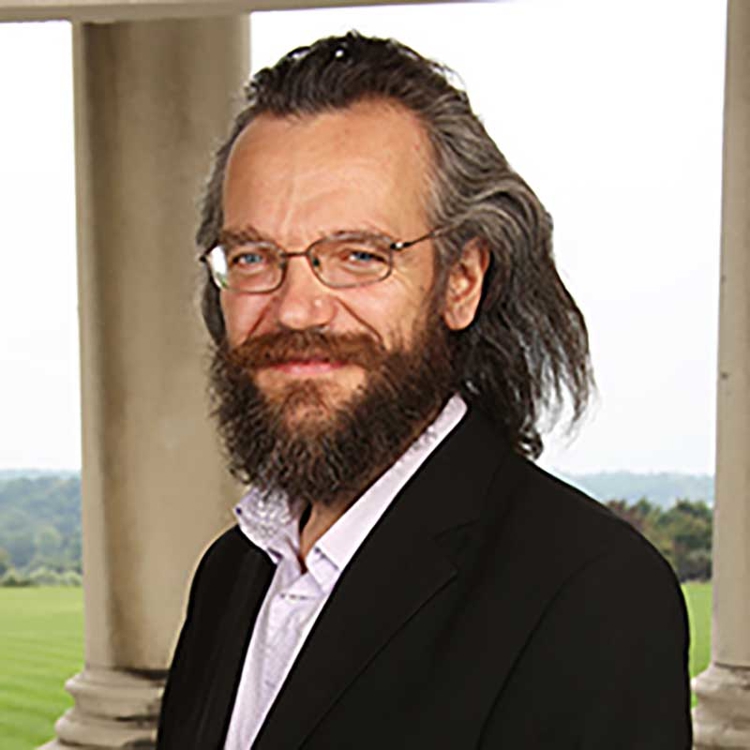
Dr Paul Dickerson
I’m Paul Dickerson, I’m a Principal Teaching Fellow and I started at Roehampton way back in 1991! Even though I have been at the University for nearly 30 years each year still feels fresh. I teach across multiple modules and programmes with a particular interest in qualitative research and social psychology and I want to enthuse everyone about this amazing subject. I love sharing my passion for psychology in all of my teaching and writing and – but don’t tell anyone – I do sometimes share a song I have written for the students that I teach. I have a particular interest in helping you to reach your full potential and I run weekly lunchtime sessions to help with this – use this link https://study.sagepub.com/psychologybrilliantessays to find out about the sorts of things covered. I hope that I will have the opportunity to help you enjoy this wonderful subject as much as I have.
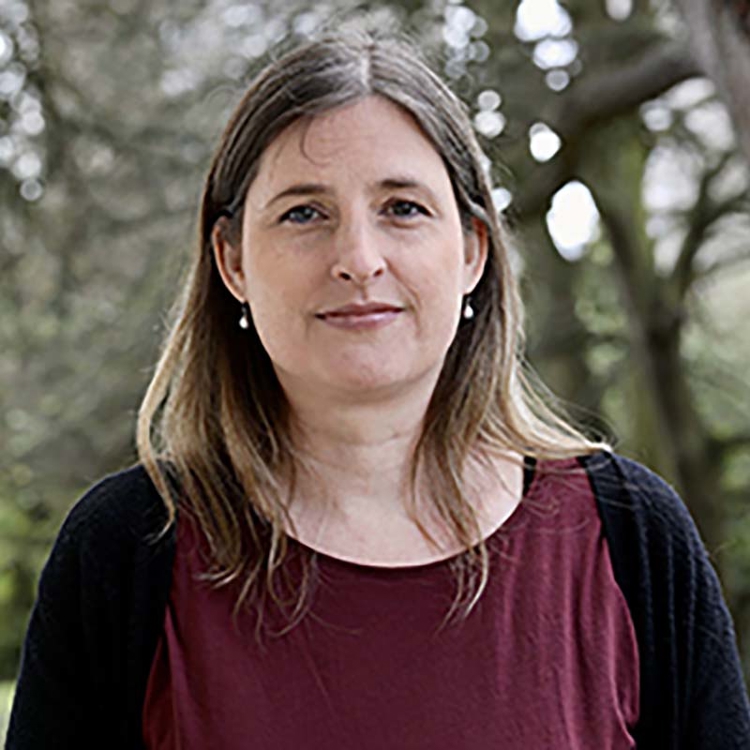
Dr Maria Gudbrandsen
Maria has a BSc in Psychology from the University of Roehampton, as well as MSc in Psychiatric Research, and a PhD in Clinical Neuroscience from the Institute of Psychiatry, Psychology and Neuroscience (KCL).
Maria is Head of Year 1 for BSc Psychology, and teach across all the BSc Psychology programmes in topics of developmental psychology, neurodevelopmental disorders, and some educational and clinical psychology. She also contributes to to the MSc Applied Cognitive Neuroscience, with a specialty in structural MRI and analysis.
Maria is also conducting her own research at the university, primarily in 22q11.2 deletions syndrome, autism and mental health.
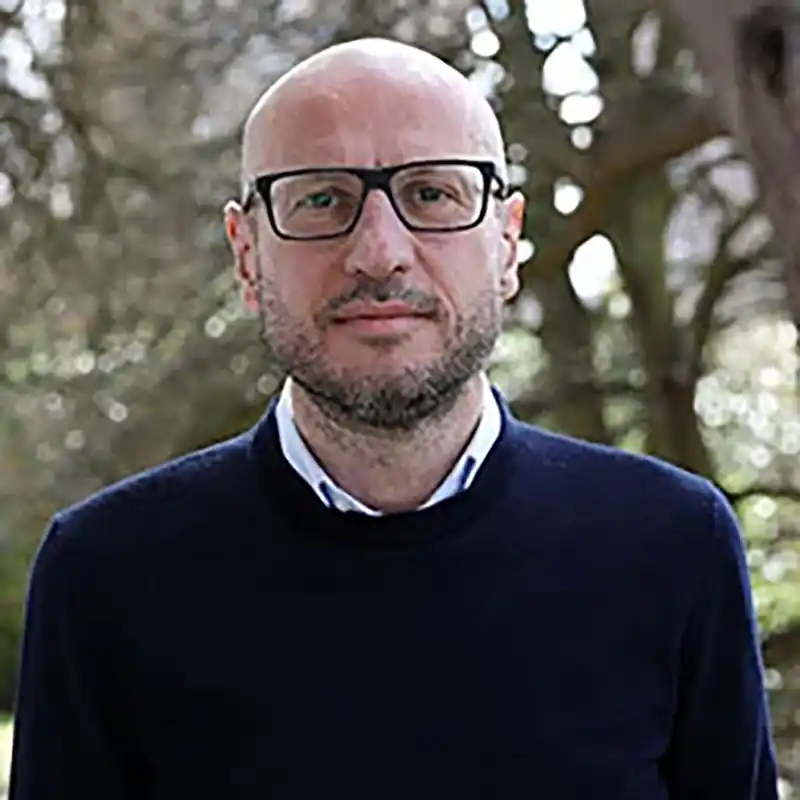
Dr Marco Sandrini
Hi, I am Marco! I have been at Roehampton since 2015. I graduated in Experimental Psychology at the University of Padua (Italy). I then obtained a PhD in Neuroscience at the University of Verona (Italy) and undertook a two-year post-doctoral fellowship at the Centre for Mind/Brain Sciences (University of Trento, Italy) and spent five-years as a research fellow at the National Institutes of Health (USA), the largest biomedical research agency in the world.
The focus of my research is interventions to enhance memory in aging and reduce the frequency of intrusive memories of trauma using the combination of neuroimaging and non-invasive brain stimulation.
I am primarily involved in the teaching of research methods and statistics and cognitive neuroscience. I am the module convenor for the second year undergraduate module “Psychological Research: Design, Analysis and Impact” and “Use of Cognitive Neuroscience Techniques” for the master in Applied Cognitive Neuroscience
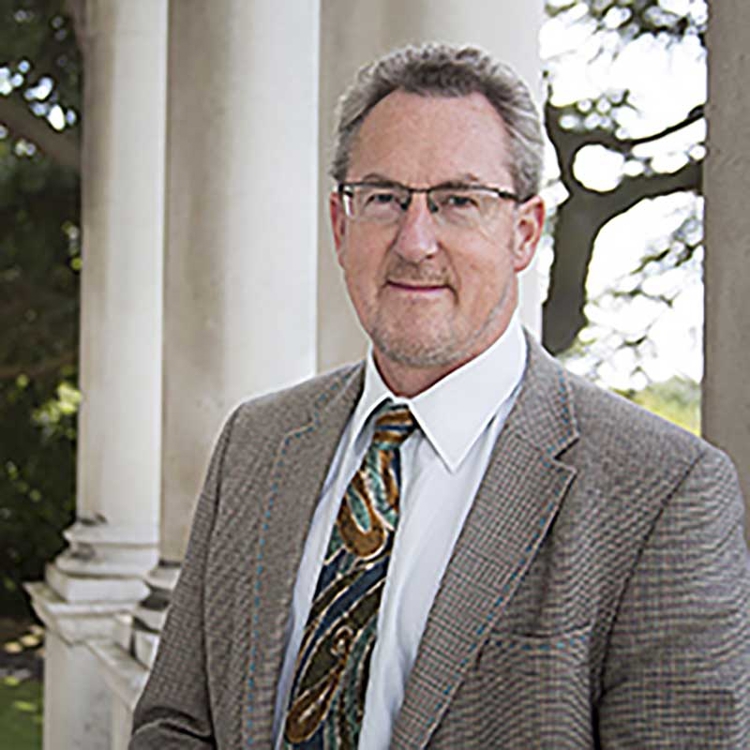
Dr Leigh Gibson
I'm an Associate Professor in Biopsychology, a Chartered Psychologist, Associate Fellow of the British Psychological Society, and Registered Nutritionist, in the School of Psychology.
After a BSc in Psychology and Physiology at the University of London, and a PhD and post-doc at the School of Psychology, University of Birmingham on biopsychological influences on food choice and appetite, I held research posts at the Institutes of Neurology and Psychiatry, and UCL. I am currently President of the Food and Health Forum, Royal Society of Medicine.
My research, supported by national and international funding from governments, industry, academia and charities, aims to understand processes controlling people's habitual diet, and their interactions with stress, health, cognitive and emotional well-being; I have authored over 130 publications. I teach across many areas of psychology at all UG and PG levels, especially biological and health psychology, and supervise UG, MSc and PhD/PsychD students in their research dissertations.
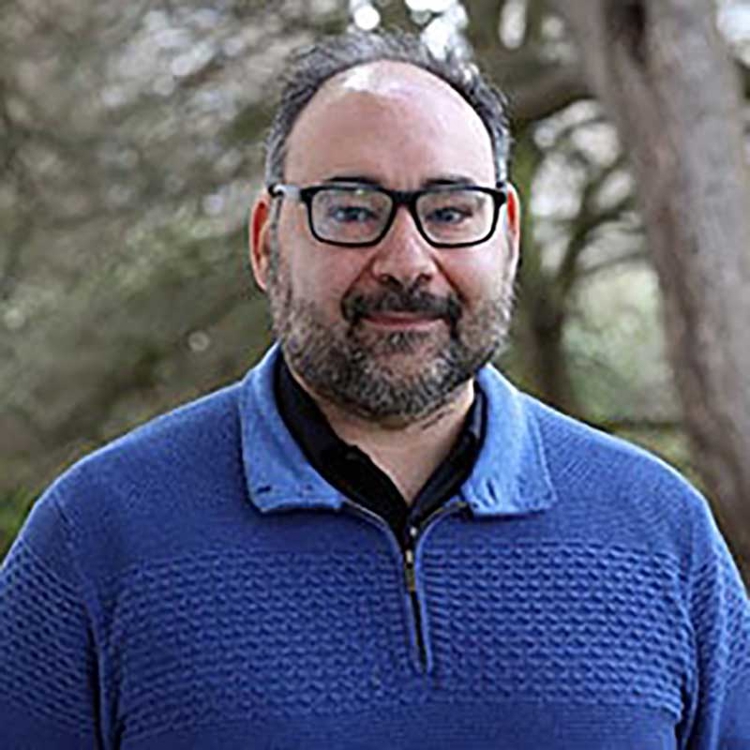
Dr Giorgio Fuggetta
I obtained my BSc and MSc in Psychology from University of Padua, Italy (2000), and received my Ph.D. in Neuroscience from the University of Verona, Italy (2006).
I was a postdoctoral research fellow at the Institute of Cognitive Neuroscience (ICN), University College London (2006-2007), and then a Lecturer in Psychology at the University of Leicester (2007-2016), before being appointed to the University of Roehampton London in 2016 as a Senior Lecturer in Psychology.
My current research explores the neural mechanisms underlying attentional control processes using electroencephalography (EEG) and Transcranial Magnetic stimulation (TMS) techniques. I am also conducting translational research in cognitive and educational psychology, studying the association between individual differences in executive function (EF) skills and academic achievement in adolescence. I teach techniques in cognitive neuroscience to MSc Applied Cognitive Neuroscience students and research methods, statistics and neuropsychology to BSc Psychology students.

Assessment
There are very few formal examinations or essays on our BSc Psychology degree.
Instead, you’re assessed through projects, tasks and exercises that replicate the working world of psychology today. These real-world assessments give you practical experience of applying psychology to the workplace through campaigns, portfolios, case studies and presentations. You’ll also develop expertise in data analysis, psychological research, and intervention reports.
Between Years 2 and 3, you can choose to enhance your practical work experience by applying for a year-long professional placement.
Career
Choose the future you want.
As a BSc Psychology graduate, you’ll have the skills and experience you need to succeed in many different careers, from counselling and clinical psychology to data analytics and marketing. You’ll also be ready to continue on to postgraduate study at Roehampton or elsewhere.

Alternative careers with psychology
The knowledge and skills you gain on this course – about human behaviour, data, communication, and teamwork – are strong foundations for a wide range of careers. Recent Roehampton graduates have gone on to work in:
- Education and teaching
- Human Resources and recruitment
- Media, marketing and public relations
- Research
- Data analytics
- Project management
- Business analysis
- Law enforcement
- Health
- Social work
Further study
Alternatively, you may choose to apply for one of Roehampton’s highly respected, specialist postgraduate courses. From Applied Cognitive Neuroscience to Forensic Psychology and Play Therapy, each course is designed to help you carve out a meaningful and rewarding career.
Open days
Get a real taste of our campus, community and what it’s like to study at Roehampton
Applying
Full-time UK undergraduate students apply through UCAS.
Course subject to curriculum enhancement and revalidation.
Entry tariff
112–128 UCAS points (or equivalent)
Foundation Year: 64–80 UCAS points (or equivalent)
Looking to work out your UCAS points or find out about our entry requirements? Find out more.
When we consider applications to study with us, we form a complete view of your achievements to date, and future potential, and can offer flexibility in entry requirements. Find out more about our Contextual Offer scheme.
Specific entry requirements
GCSE requirement: Maths, Grade 4/C.
General entry requirements
September 2025 entry tuition fees
UK (home) tuition fees
Undergraduate degree: £9,535
Foundation Year: £9,535
We offer a wide range of scholarships and bursaries. See our financial support pages for UK students.
We also provide other ways to support the cost of living, including free buses and on-campus car parking, hardship support and some of the most affordable student accommodation and catering in London. Find out more about how we can support you.
Additional costs to consider
Travelling to and from work experience may require some additional expenses.
It is possible you could have to pay for an enhanced DBS check depending on the work experience / if your dissertation requires this, however, this would be rare.
Any field trips may involve expenses.
International undergraduate students apply through our direct application system.
Course subject to curriculum enhancement and revalidation.
Entry tariff
112–128 UCAS points (or equivalent)
Foundation Year: 64–80 UCAS points (or equivalent)
Looking to work out your UCAS points or find out about our entry requirements? Find out more.
When we consider applications to study with us, we form a complete view of your achievements to date, and future potential, and can offer flexibility in entry requirements. Find out more about our Contextual Offer scheme.
Specific entry requirements
GCSE requirement: Maths, Grade 4/C (or equivalent)
General entry requirements
September 2025 entry tuition fees
EU and international tuition fees
Undergraduate degree: £16,950
Foundation Year: £16,950
International Foundation Pathway: £16,950
We offer a wide range of scholarships and bursaries. See our financial support pages for international students.
We also provide other ways to support the cost of living, including free buses and on-campus car parking, hardship support and some of the most affordable student accommodation and catering in London. Find out more about how we can support you.
Additional costs to consider
Travelling to and from work experience may require some additional expenses.
It is possible you could have to pay for an enhanced DBS check depending on the work experience / if your dissertation requires this, however, this would be rare.
Any field trips may involve expenses.






